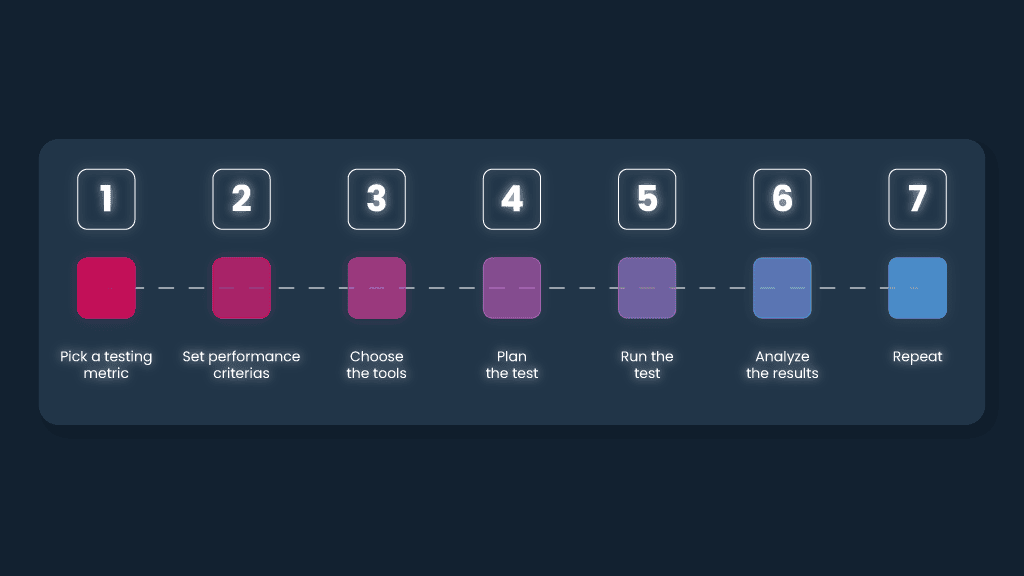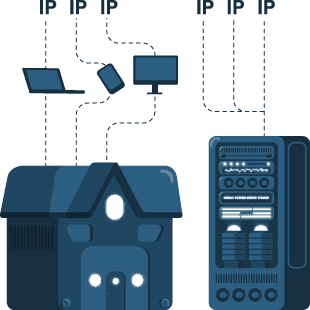Proxies for Load Testing
Make sure your site can handle going viral! Use a simple gateway to send unlimited requests from different IP addresses and verify that your servers can deal with massive connection loads.
14-day money-back option

55M+ residential IPs

Global coverage and city targeting

Advanced proxy rotation

Up to 24hrs custom sticky sessions

99.99% uptime

Unlimited connections

24/7 instant tech support

Flexible pricing
Load Testing? You need proxies.

What is load testing?
Load testing method examines how your system handles higher loads while simulating greater than usual web traffic. By mimicking real user action, you can spot all the performance limitations in your app, website, or other systems. Early noticed, early fixed!

How does load testing work?
Load testing can be done with the help of load generators that are paired with quality proxies. The generator simply directs web traffic by sending HTTP requests to your system. Then the target tries to deal with all those requests and return the response.
Proxies act as an intermediary between the generator and the target. Simply, they help to simulate a significant boost in traffic without blocks.
Load testing flow

- Choose the metric you want to test (response time, maximum user load, resource capacity, etc.)
- Decide on the performance criteria. If you are testing the number of possible users, set your target on how many visitors is satisfactory for your web application, API or database to handle.
- Pick the right tool for load testing. A load generator paired with a proxy server is your go-to solution. Just make sure that your chosen solution can create enough workload.
- Plan the test – decide on the best time for running a test and set a clear schedule.
- Run the test.
- Analyze the results.
- Repeat the test if needed.
Residential proxies are full of awesomeness

Unlimited connections and threads

55M+ rotating IPs

IPv4, HTTPS addresses

Over 195 countries

Easy proxy setup

Real mobile and desktop devices IPs

Awesome 24/7 customer support

<0.5s avg response time

Up to 24hrs custom sticky sessions

Traffic usage statistics
Load testing vs. stress testing
More load = more stress for the system? Well, not exactly! Load testing shows how your web application behaves when facing higher than usual loads, like DDoS attacks, while stress testing helps measure the maximum limit of the system’s capacity dealing with load.

Load testing vs. performance testing
Performance tests measure the overall system’s behavior from different angles. It shows how the system performs while facing loads and checks the stability levels, response time, and scalability.
Therefore, both load and stress tests fall under the umbrella of performance testing.
Market-leading proxies for load and stress testing
Here’s what you get if you roll with Smartproxy:
- 55M+ elite proxy pool. Our residential IPs come from real devices, including mobile phones. Your load tests can simply be more realistic with IPs connecting from different locations and devices.
- 195+ worldwide locations, including cities and US states, for you to test the load coming from different corners of the world.
- 24/7 support from our proxy angels and a dedicated account manager. If something goes wrong – we'll be there for you. Ping us on the live chat or contact your account manager!
- Pure anonymity and security.
- No limits on connections and threads. You can enjoy endless load tests without any “stuck on the loading screen.”

Datacenter vs. residential proxies in load testing
Human-like traffic is exceptionally important when load testing. Residential IPs win over datacenter proxies in this case. Datacenter IPs are great in terms of stability and speed, but they share the same subnet and don’t simulate the reality-resembling traffic.
Our human-alike residential IPs come from different locations, so they can make your load test as close to reality as you wish.
Load testing use cases

Web application performance after introducing a promotion
Discounts are fun and bring more buzz to your web. Test your loads before the big day if you don't want to upset your clients with broken pages during the intense purchasing process.

Mobile game performance in the production stage
New and untested applications are like a box of chocolates – you never know if you’ll be the lucky one or end up on a frozen screen. The production stage is the best time to notice and solve possible inconveniences related to enormous loads.

Mail server ability to handle huge email loads
Email-borne attacks are still one of the biggest threats for businesses. During the attack the inboxes are bombarded with thousands of emails making it useless. Knowing your server’s capability of handling email loads could help you to survive such an attack easier.
Fastest residential proxies
Pick a plan that suits you. Get ahead with unblockable and stable proxies.
8 GB
$5.5
$2.75/ GB
Total:$44$22 + VAT billed monthly
Use discount code - RESI50
25 GB
$5.2
$2.6/ GB
Total:$130$65 + VAT billed monthly
Use discount code - RESI50
50 GB
$4.9
$2.45/ GB
Total:$245$123 + VAT billed monthly
Use discount code - RESI50
100 GB
$4.5
$2.25/ GB
Total:$450$225 + VAT billed monthly
Use discount code - RESI50
With each plan you access
55M+ ethically-sourced IPs
HTTPS & SOCKS5 support
<0.5s average response time
99.68% success rate
Unlimited threads & concurrent sessions
Country, state, city ASN & ZIP code targeting
Rotating and sticky sessions
#1 IP quality in the market
Free 24/7 tech support
SSL Secure Payment
Your information is protected by 256-bit SSL
Google Pay and Apple Pay are only available with Smart Wallet*
What people are saying about us
We're thrilled to have the support of our 50K+ clients and the industry's best

Best online Customer support I've gotten
Customer Support is amazing, agent walked me through an issue I've been dealing since...
Featured in:
Frequently asked questions
What is a load balancer?
A load balancer acts as a distributor by routing the received traffic to different servers to ensure a balanced web traffic load. By doing that the load balancer optimizes the system's capacity to deal with the increased load without affecting performance.
If one of the servers is burned out, the load balancer just shifts the load to others to diminish the effect on the final result.
What are the differences between a load balancer and a proxy?
A load balancer can be considered a reverse proxy that translates the user's HTTP request to a server and then returns the answer. Simply put, reverse proxy aims to increase the scalability and performance of software and ensure computer security.
What is load balance testing?
This testing method stands for analyzing the process of requests and traffic distribution over multiple servers. Such a test shows what can be improved in this process to make the best possible optimization to deal with a huge load. The end goal of load balance testing is to ensure maximum web application availability for the users.






















